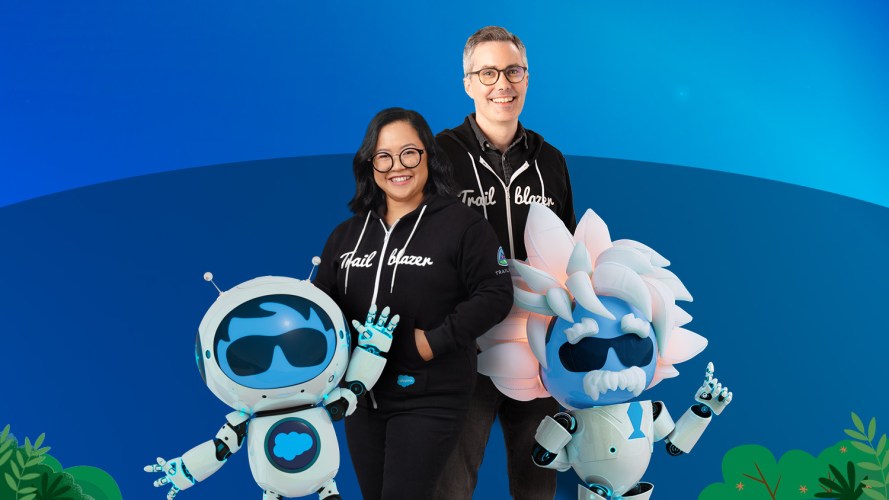The LLMs behind Agentforce for Developers

Now generally available, Agentforce for Developers represents a significant step in Salesforce's mission to drive innovation and deliver intelligent development tools. Let’s explore how Agentforce, powered by Salesforce AI Research’s large language models, is transforming the way you code.
TLDR; We are thrilled to announce that Agentforce for Developers, formerly known as Einstein for Developers, is now generally available! Agentforce for Developers uses the power of Salesforce AI Research’s proprietary large language models (LLMs), including CodeGen2.5 and our new xGen-Code model.
Imagine having an AI assistant embedded right in your IDE, simplifying coding tasks and effortlessly boosting productivity. That’s the power of Agentforce for Developers—a cutting-edge, generative AI tool designed to make coding smarter and faster. Whether you’re crafting complex algorithms or fine-tuning your workflow, Agentforce enhances every part of the development process.
Formerly known as Einstein for Developers, Agentforce for Developers is Salesforce’s AI-powered solution, built to supercharge productivity directly within your IDE. From code generation and unit test creation to seamless in-line auto-completion, it streamlines your workflow with precision and intelligence.
Now generally available, Agentforce for Developers represents a significant step in Salesforce’s mission to drive innovation and deliver intelligent development tools. Let’s explore how Agentforce, powered by Salesforce AI Research’s large language models, is transforming the way you code.
Salesforce’s In-House LLMs
A large language model is a trained, deep-learning model that understands text and is able to generate text. It conditions on the previously generated words to predict which new word to generate next. Code generation is hence a task that is well-suited to an LLM. The powerhouse behind the Agentforce for Developers is a set of our own in-house Large Language Models called CodeGen and xGen-Code developed by Salesforce AI Research.
Leveraging our in-house LLMs provides three key benefits:
- Tailored Performance: Our models are fine-tuned for Salesforce-specific developer tasks, drawing on rules and insights from developer-focused tools like Code Analyzer and ApexGuru to deliver optimal quality.
- Enhanced Trust and Security: Your code stays securely within the Salesforce environment, ensuring a trusted experience. We also safeguard sensitive information by masking it and conducting toxicity checks before generating responses.
- Sustainability: By deploying the right-sized model for each task, we not only enhance efficiency but also uphold Salesforce’s commitment to sustainability—a core value we prioritize.
Let’s take a deeper look at these models.
Code Faster and Better with Agentforce
Discover how Agentforce for Developers empowers you to build applications and intelligent agents faster than ever. We’ll explore the LLMs behind Agentforce and showcase its features designed to enhance code quality and efficiency.



CodeGen
Salesforce AI Research created and trained an open-source in-house LLM for code understanding and generation, and we called it CodeGen. CodeGen has been trained on a wide variety of programming languages, including Apex.
Launched in 2023, CodeGen2.5 is a compact model designed primarily for low latency programmer-specific features such as ‘code completion’. It has been powering Agentforce for Developers, delivering enhanced coding precision and efficiency. Capabilities include:
- Domain-Specific Training: We further finetune the model to better adapt to the Apex programming language use cases. In addition, we also specifically aligned the model outputs so that it is aware of the scope of generation.
- Continuous Learning of Apex: We repeatedly run internal testing and gather feedback from our Apex experts, which we then use to improve the model.
- Security, Enabled by our Trust Layer: Customer prompts, customer feedback, and Agentforce-generated code is securely protected by Salesforce’s trust boundary, and no data ever leaves Salesforce.
As we saw CodeGen is amazing for code generation and development, but what about tasks that require natural language?
xGen-Code
As we expanded the interactive capabilities of Agentforce for Developers—like the multi-turn chat experience with Dev Assistant—we realized the need for a model that excels in both natural language and programming tasks. This led to the introduction of xGen-Code, the latest addition to Salesforce’s in-house family of large language models (LLMs).
The xGen family already includes models like xGen-Sales and xGen-MM, known for powering a wide range of use cases, from text generation to multi-modal tasks and complex retrieval functions. xGen-Code is specifically designed for developer-centric tasks, making it an ideal fit for the coding challenges developers face in Salesforce environments.
xGen-Code stands out for its deep understanding of Salesforce developer use cases, outperforming other models—whether open-source or proprietary—in accuracy and efficiency. It’s equipped to handle tasks requiring complex understanding, dynamic interactions, and evolving multi-turn conversations. This makes it perfect for features like Dev Assistant, where the AI adapts and responds intelligently as the conversation progresses. To enable strong capabilities on both natural and programming language tasks, xGen-Code went through multiple stages of training. In each stage of training we shift the data distribution mix between code and natural language to improve the performance of the model in both data domains.
For faster, low-latency tasks such as code completion, we rely on CodeGen, a smaller but highly efficient LLM. When developers need a more interactive and in-depth experience, xGen-Code powers the Dev Assistant, enabling a richer, more conversational approach to programming.
In short, we’ve tailored the model selection to fit the task: CodeGen for quick, on-the-fly completions, and xGen-Code for deeper, more interactive development support.
Salesforce on Salesforce
This model-driven approach is at the heart of how Salesforce continuously enhances its developer tools. Salesforce’s strategy for improving Agentforce for Developers revolves around optimizing for specific workflows that our teams know best.
Salesforce launched CodeGenie, an internal IDE-based tool aimed at boosting developer productivity by supporting various programming languages and internal codebases. Feedback from CodeGenie users feeds directly into improvements for Agentforce for Developers, benefiting external developers.
Since the launch of CodeGenie, there has been significant engagement, with developers accepting over 2 million lines of code and posing more than 500,000 chat questions.
In a survey that we conducted internally we saw that on average a developer who used a product powered by these models was able to save ~125 minutes a week.
This level of interaction underscores the utility and effectiveness of the AI tools being developed, demonstrating their impact on improving developer productivity and software development processes.
Resources
- Explore in-depth details on Agentforce for Developers’ features and innovations in our documentation, and check out our public roadmap for what’s next
- For any feedback or issues, visit our issues repository
- Salesforce AI Research website
- Follow us on X: @SFResearch
Code Faster and Better with Agentforce


























